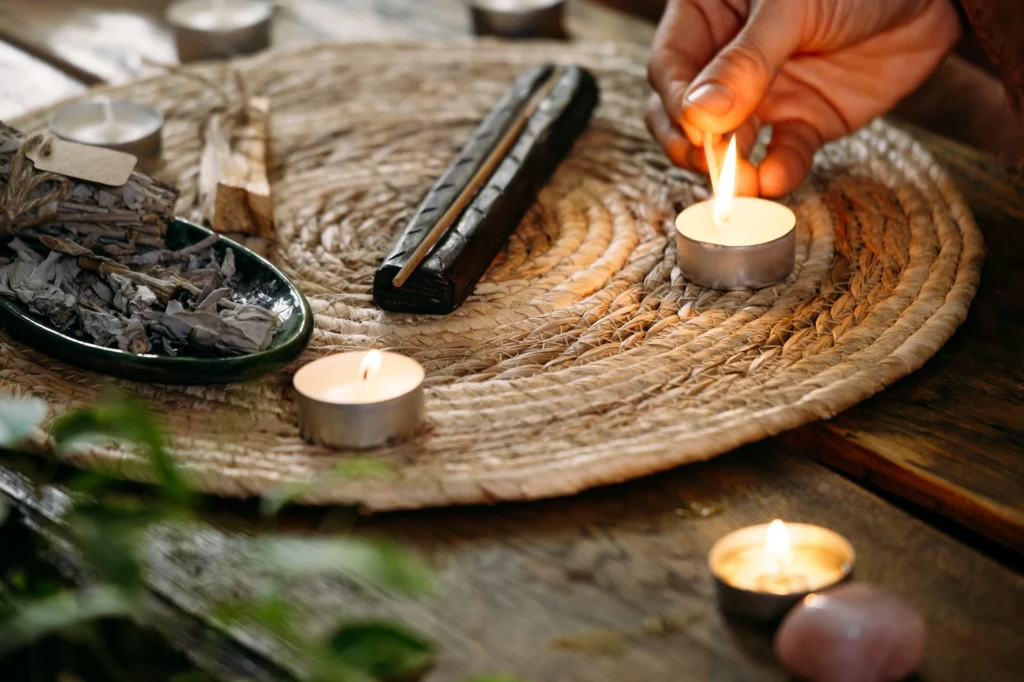Recovery rituals are simple, meaningful actions that help people stay focused and grounded on their path to wellness. Whether you’re working through addiction treatment, alcohol rehab, or managing a dual diagnosis, rituals in recovery can make a huge difference. They help you create structure, build healthy habits, and stay connected to your goals. In this article, we’ll explore seven powerful rituals that can support your mental health and strengthen your recovery journey, whether you’re in Asheville, NC, or anywhere else.

What Are Recovery Rituals?
Recovery rituals are actions you do regularly that hold special meaning. These rituals help create order in your life, especially when things feel chaotic. For those in substance abuse treatment, whether at Asheville Recovery Center in Asheville, NC, or another location, rituals in recovery can provide the stability needed to stay on track. Clinicians often recommend establishing rituals as part of a comprehensive recovery plan, which may include holistic therapies and other supportive practices. These rituals add to the overall functionality of your recovery plan, helping you stay focused and committed.
Why Are Rituals Important in Recovery?
When you’re in recovery, building a new life requires new habits, routines, and a strong focus on wellness. Ritual recovery offers many benefits, helping you stay grounded and focused on your goals. Recovery rituals help you achieve this by:
- Creating Structure: Substance abuse often leads to an unstructured, unpredictable life. Rituals bring order and routine, which are essential for staying on track.
- Supporting Mental Health: Many rituals encourage mindfulness and reflection, which are key to maintaining good mental health during recovery. This is especially important in drug rehab and other forms of treatment, including intensive outpatient programs (IOP).
- Building Connection: Some rituals involve others, like attending meetings or participating in group activities. These connections are crucial in substance abuse treatment and alcohol rehab.
- Reinforcing Commitment: Engaging in rituals regularly reminds you of your commitment to recovery, making it easier to avoid relapse. Healthcare providers and clinicians often emphasize the importance of these practices in maintaining long-term sobriety.
- Fostering Wellness: Rituals promote overall wellness by encouraging healthy habits, whether they involve physical activity, spiritual practices, or holistic therapies like an ice bath, cold water immersion, or yoga.

Common Rituals in Recovery
Let’s look at some common recovery rituals that people find helpful:
1. Attending Meetings
Going to support group meetings like Alcoholics Anonymous (AA) or Narcotics Anonymous (NA) is a powerful ritual in recovery. These meetings offer a safe space to share your experiences, get support, and stay accountable. Attending regularly helps build a routine, which is especially important in drug rehab, intensive outpatient programs (IOP), and other substance abuse treatment settings in Asheville, NC, and beyond.
2. Daily Reflections
Starting or ending your day with a few minutes of reflection can be a grounding ritual. You might read a daily meditation, think about your goals, or just sit quietly. This practice supports mental health by helping you stay focused and prepared for the challenges of recovery, a key component recommended by clinicians in various treatment programs.
3. Journaling
Writing in a journal or journaling app is another effective ritual. It provides a way to process your thoughts, track your progress, and recognize patterns. Journaling can be especially helpful for those dealing with a dual diagnosis, as it helps manage both mental health and addiction recovery.
4. Celebrating Milestones
Recovery is a journey, and it’s important to celebrate your progress. Whether it’s 30 days, 6 months, or a year of sobriety, recognizing these milestones is a common ritual. Celebrating these achievements is vital in both drug rehab and alcohol rehab settings, reinforcing your commitment to staying sober.
5. Practicing Gratitude
Gratitude is a simple but powerful ritual. Writing down three things you’re grateful for each day can shift your focus from what’s wrong to what’s right. This practice can improve mental health and promote a positive mindset, which is crucial in recovery.
6. Staying Active
Physical activity is an important ritual that supports both physical and mental wellness. Whether it’s a morning walk, yoga, a cold plunge, or an ice bath using cold water, regular exercise helps reduce stress and improves overall health. Many treatment centers, including Asheville Recovery Center in Asheville, NC, offer holistic therapies like these to enhance the recovery process. Incorporating these activities into your everyday routine is key to maintaining sober living.
7. Spiritual Practices
For many, spiritual or religious rituals are key to their recovery journey. This could include prayer, meditation, or attending services. Spiritual practices offer comfort, guidance, and a sense of purpose, all of which are beneficial in managing addiction and maintaining mental health.
Creating Your Own Recovery Rituals
While these common rituals are helpful, it’s also important to create your own. Personal rituals can be tailored to your specific needs and goals, making them even more effective. Here’s how to start:
- Identify Your Needs: Think about where you need more stability or support. Do you struggle with morning routines? Need more time for self-reflection? Identifying these needs will help you create rituals that address them.
- Start Small: Don’t overwhelm yourself by trying to implement too many rituals at once. Start with one or two simple practices and build from there.
- Be Consistent: Rituals are most effective when done regularly. Try to perform your rituals at the same time each day or week, so they become a natural part of your routine.
- Make It Meaningful: Choose rituals that resonate with you. The more meaningful they are, the more likely you are to stick with them.
- Be Flexible: Life can be unpredictable, so it’s important to be flexible with your rituals. Adjust them as needed to keep them supportive rather than stressful.
Conclusion
Recovery rituals play a crucial role in substance abuse treatment and maintaining wellness. Whether it’s attending regular meetings, practicing gratitude, or creating your own personal rituals, these practices provide the structure and support needed for a successful recovery. Asheville Recovery Center in Asheville, NC, can help you develop healthy rituals that align with your recovery goals. Our experienced clinicians and healthcare providers are here to guide you in incorporating rituals into your daily life, strengthening your commitment to sobriety, improving your mental health, and building a balanced and fulfilling life.
If you’re looking to enhance your recovery journey or have questions about different treatment programs, reach out to us at Asheville Recovery Center. We’re here to help you create the structure and support you need to achieve lasting sober living. Whether you’re in a partial hospitalization program (PHP), an intensive outpatient program (IOP), or exploring other treatment approaches, our team is dedicated to supporting your path to wellness.
For more information on how to incorporate rituals into your recovery, check out the FAQs provided by Asheville Recovery Center or speak directly with our healthcare providers. Understanding the functionality of these rituals in your recovery plan can make a significant difference in your journey to lasting sobriety.






